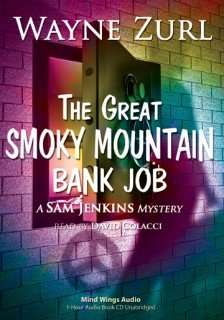The Great Smoky Mountain Bank Job
 Sam Jenkins’ law enforcement colleagues know he’s quick to ask a professional favor. But when a beautiful Treasury agent asks for his assistance, he balks.
Sam Jenkins’ law enforcement colleagues know he’s quick to ask a professional favor. But when a beautiful Treasury agent asks for his assistance, he balks.
Special Agent Lucy Frobisher wants Sam to re-open a forty-three year old investigation and find her father’s killers.
Reluctantly, the ex-New York detective turned Tennessee police chief delves into the robbery-homicide and finds himself back in the 1960’s, chasing down a group of anti-government anarchists who robbed banks to finance their violent revolution.
Join Sam and his friends from Prospect as he tracks down a former school mate who found herself a spot on the FBI’s 10 Most Wanted List.
Purchase books and eBooks from:
Read An Excerpt
Things happened in 1968. Assassins killed Bobby Kennedy and Martin Luther King. I was a young soldier waiting for my twelve-month vacation to the Republic of South Vietnam. And Prospect, Tennessee, a small town in the foothills of the Smokies, gained prominence. Thanks to the national media, an armed robbery which took place in Prospect became known as The Great Smoky Mountain Bank Job.
Forty-three years later, Sergeant Bettye Lambert buzzed my intercom. “Chief, there’s a Miss Lucy Frobisher here to see you.” “About what?” I asked. “Something you’ll want to hear.”
I get suspicious when a good-looking and well-dressed woman walks into my office carrying a briefcase. I expect her to hand me a document and say the magic words, “You’ve been served.”
That didn’t happen. Instead, she offered me a hand. “Hi, I’m Lucy Frobisher. I’ve got a problem and Special Agent Ralph Oliveri thinks you can help me.” I grimaced at the mention of Oliveri. “Obviously you already know I’m Sam Jenkins.” She smiled. “I do.” I shook her hand. “Sit down,” I said, pointing to one of the guest chairs in front of my desk. “Tell me about your problem.”
Lucy took a seat and looked at me with expressive light brown eyes. Her two-piece navy blue suit appeared expensive. The skirt landed only an inch above her knees, which she held together very properly.
“My father was murdered,” she said. “I’d like you to help me find the killers.” That’s not the kind of request you hear everyday in a small Tennessee police department. I’d ask how Ralph Oliveri, my pal from the FBI’s Knoxville field office, got involved, but I started with a few more basic questions.
“Did this happen in Prospect?” “It did.” “When?” I sounded surprised. No one had mentioned it to me. “April 15th, 1968.”
After that I was surprised. I did some quick math and came up with a figure. I would have placed Lucy Frobisher in her late-thirties, but with her father getting killed forty-three years ago, she had to be at least forty-two.
“I assume your father’s death was reported back then?”
“Of course. My father was the guard at the Prospect Citizen’s Bank and Trust when it was robbed. Are you familiar with what the papers called The Great Smoky Mountain Bank Job?” “No. I’m sorry. In 1968 I was at Fort Bragg and not reading too many newspapers.” “The robbers were anarchists—anti-war types. They killed my father when he tried to stop the robbery.” “And you spoke to Oliveri because the FBI assumed responsibility for the case?” “Yes.”
I noticed her looking around the room—at the flintlock Tennessee rifle hanging on the wall behind my desk, at the shadow box with the medals and badges from my time in the Army, and at the counter where the mini-refrigerator, coffee maker, and a vase of artificial flowers sat.
“And no one was arrested for the robbery or your father’s murder?” “No.” “Why do you think I can solve this mystery after forty-three years?” “Because I think at least two of the robbers were from New York.”
I stared at her. She pushed a few strands of shoulder-length dark brown hair behind her right ear and smiled. Lucy Frobisher was trim and quite pretty in a very professional way—like a tall Audrey Hepburn. “And Oliveri told you I was a cop in New York for a long time.” She nodded. “He did.” “And you think I can resurrect an old case and track down former SDS or Black Panther members or other anti-war, anti-government thugs when the entire FBI couldn’t?” “They were part of the Revolutionary Youth Movement and I have new information.”
I heard the radio crackle out in the lobby. Bettye dispatched PO Jamey Hawkins to a first aid case at a trailer park off Doc Beasley Road. “Why won’t the feds act on this information?” I asked. “They say it’s not sufficient to reopen an old case.” That sounded like rubbish to me. “Ms. Frobisher, I’m sorry your father was killed, but I’m only one guy with a small police department to run. Even though it happened in Prospect, I doubt I can . . .” I let my sentence trail off. “May I tell you the whole story?” she asked. She sat back and crossed her legs. I think she anticipated my answer. That or she knew a big smile and a few extra inches of lovely knee would influence my decision. “Sure.” Then thinking she may take more than a few minutes, I said, “Would you like coffee? I have a fresh pot.” “Thank you. Dark no sugar, please.”
I fixed two cups and watched her take a stack of newspaper clippings and official reports from her briefcase.
I sat behind my desk, took a sip of an extremely hot Indonesian blend, and listened to Lucy tell me her father, Douglas “Buck” Frobisher, not only worked as a bank guard, but also served as a Blount County deputy sheriff, the security job being only a part-time gig.
According to Ms. Frobisher, the robbery went off like something from a 1970s “heist” movie. Three males and one female entered the bank just before closing time carrying shotguns and pistols. All wore rubber Halloween masks. After an attention-getting shot went off and Buck Frobisher stepped out of the men’s room, he drew his revolver and foolishly told the four armed felons to drop their guns. One of the males fired his shotgun and Frobisher bought the farm. The anarchists made off with $46,000 dollars before a bank employee could trip a silent alarm connected to the police station.
Two days later, in a message sent to the Knoxville News-Sentinel, members of the RYM claimed responsibility for the robbery.
The former Prospect police chief, one Eli “Peanut” Crowder, called in FBI assistance. Lucy said the investigation lasted for months, but as with many crimes perpetrated by a crop of home-grown anarchists from the late ‘60s, it remained unsolved.
“You don’t seem to have a problem talking about your father’s death,” I said. “No, I’ve lived with the fact all my life. And I never knew him. My mother was pregnant when he died.” “You’re certainly tenacious.” “Unfinished business.” Lucy slowly nodded with a look of resolution crossing her pretty face. “I think these people should pay for what they did to my mother.” She looked at me over the top of her coffee mug. “No argument there. But the same question keeps popping up, Ms. Frobisher. Why do you think I can solve this?” “Please,” she said, batting her eyelashes, “call me Lucy.” “Okay, Lucy, back to my question.” A little more eyelash action, then, “May I call you Sam?” “Sure, everyone else does.” “Well, Sam, I believe you know one of the killers.”










